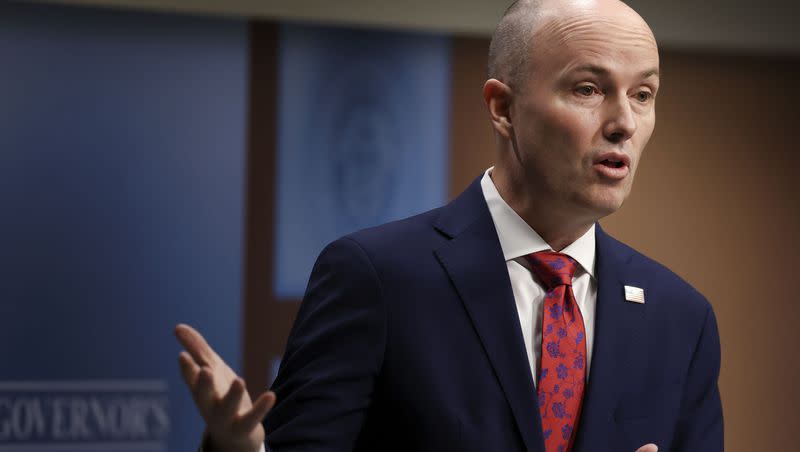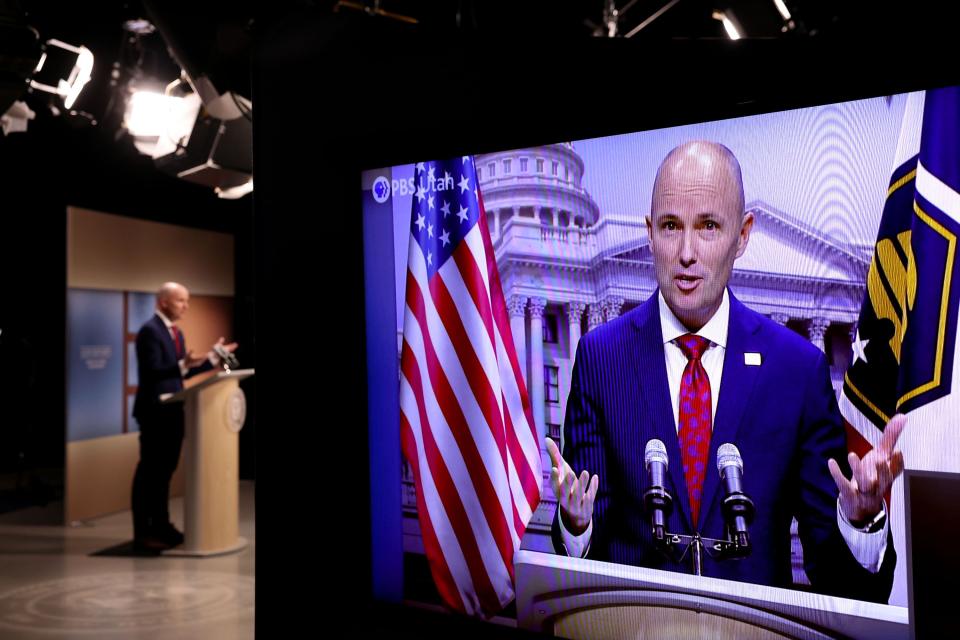Cox calls DEI overhaul a ‘positive vision’ for struggling students in Utah

Utah Gov. Spencer Cox spoke for the first time on Thursday about his decision to sign legislation banning “discriminatory” DEI practices in public entities and expanding race-neutral student success resources at universities.
Cox, addressing reporters during his monthly televised PBS press conference, thanked state lawmakers for producing what he said was a constructive alternative to bills across the country that defunded campus diversity, equity and inclusion programs without leaving anything in their place.
“This is really a positive vision of how do we help our minority communities and all students who are struggling,” Cox said.
Related
The bill, HB261, was one of the first high-profile measures to be addressed in the state Legislature this year, receiving a final vote in both chambers before the end of the second week. Cox signed the measure into law on Jan. 30 as part of the first group of bills to leave his desk.
Drafted in discussion with the Utah Board of Higher Education, university administrators and professors, the bill, Equal Opportunity Initiatives, will outlaw DEI trainings, requirements, programs and offices at public universities, schools “or any other institution of the state,” that engage in what the legislation calls “prohibited discriminatory practices.”
The bill also offers general language that commits continued funding for student success centers at universities as long as they ensure all students have access to the programs offered.

Bill sponsors Rep. Katy Hall, R-South Ogden, and Sen. Keith Grover, R-Provo, said the direction provided to universities in the bill is not “overly prescriptive.” They clarified that students currently receiving special support from DEI offices would continue to receive it, but that such programs would no longer be targeted toward identity groups, at the exclusion of others, based on ethnicity, religion, sexual orientation or other “personal identity characteristics.”
Related
Cox said “focusing on race neutral policies that will help all of our students” will likely mean new or modified university resource centers geared toward first-generation college students and degree completion, “making sure that all students who are coming in have the tools necessary, the communities necessary, the inclusion necessary, the support necessary to actually graduate.”
But limiting consideration to these factors, Cox said, will still provide special support to the communities DEI was created to serve.
“Any type of focus, again, in a race neutral way, is going to really help a disproportionate number of our minority students, because they’re more likely to be first generation college students,” Cox said.
In December, Cox condemned some DEI practices, including required diversity statements in hiring and admissions, arguing they had failed to achieve their stated goals of helping students, instead fostering “identitarianism” and stifling intellectual diversity.
Hall and Grover also argued that DEI programs can create a chilling effect in academic institutions, often ruling out conservative viewpoints, and highlight racial divisions while showing little effect on participants’ actual sense of belonging.
Related
However, Democratic lawmakers pushed back, firmly opposing the measure which they said removed vital support systems for the state’s most vulnerable populations and would have unintended consequences like discouraging tough conversations about racism in schools.
“These programs are essential for fostering knowledge, understanding, empathy, and respect among our diverse population. By restricting their implementation, we are erasing the progress we have made in building a more inclusive society,” Senate Democrats said in a statement after HB261 was signed.
Cox insisted the disagreement is not about whether universities need to be places of inclusion and diversity of thought, but how best to bring that about.
“This isn’t saying that we don’t care about about these communities. It’s the exact opposite. We care deeply. But we want to do it in a way that benefits everyone,” he said.
As universities, state agencies and the public school system work to come into compliance with the law, Cox said he and state lawmakers will look for modifications to “make sure that as we’re implementing this new law, that it will work the way it was intended to work.”
“This is not a done thing, or a settled thing,” he said, later adding, “So we’ll be watching very closely and responding if there are any unintended consequences.”
Related

